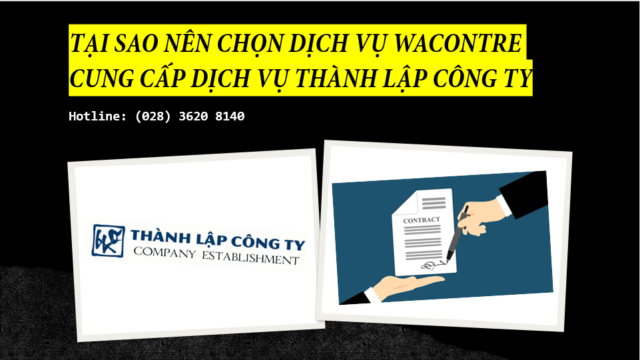Setting up a company is a crucial first step for any entrepreneur or investor. It is not only about creating a legally recognized business entity but also about laying the foundation for long-term growth. This article provides a detailed guide on company formation, including the procedures for foreign-invested enterprises and businesses in the food industry. With comprehensive and up-to-date information, you will gain insights into the essential steps required to successfully launch your business.
1. What is Company Formation?
Definition and Role of Company Formation
Company formation is a legal process that establishes a business entity recognized by law. A company is not only a place where business activities are organized but also a legal structure that protects the rights of stakeholders, including owners, investors, partners, and customers. For entrepreneurs, it serves as a crucial legal framework to ensure transparency and sustainable growth.
Why Does Company Formation Require Strict Legal Procedures?
Establishing a company with clear legal procedures ensures that the business operates lawfully, minimizing legal risks in the future. These procedures also facilitate access to loans, customers, and business cooperation opportunities while building trust with stakeholders.
Common Types of Companies in Vietnam
In Vietnam, the most common types of companies include:
- Single-Member and Multi-Member Limited Liability Company (LLC): Suitable for small and medium-sized enterprises (SMEs).
- Joint-Stock Company (JSC): An ideal choice for businesses looking to raise capital and expand operations.
- Partnership and Private Enterprise: Best suited for small-scale business models.
Legal Requirements for Food Companies
Food companies must comply with food safety and hygiene regulations, covering everything from raw material sourcing and production processes to product storage. Meeting these requirements is mandatory to ensure that products meet market circulation standards and gain consumer trust.
Learn more: Company Formation Services – Reliable & Fast at Wacontre
2. Conditions for Establishing a Company in Vietnam
General Requirements for Domestic Investors
Domestic investors must meet basic requirements regarding legal capacity and civil conduct. This includes preparing valid identification documents such as a citizen identification card or passport, demonstrating financial capability, and ensuring they are not on the list of individuals prohibited from doing business. Additionally, the registered business sector must not fall under the prohibited categories as per Vietnamese law. Investors must ensure that the charter capital aligns with the industry and the company’s expected scale. These documents are essential prerequisites to ensure a valid company registration application.
Specific Conditions for Foreign-Invested Enterprises
Foreign-invested enterprises must comply with additional conditions, such as industry-specific regulations and capital contribution ratios as stipulated by the Vietnamese Investment Law. Foreign investors must prepare a clear business plan, legal documents related to their investment capital, and submit an application for an Investment Registration Certificate before proceeding with company establishment steps. Certain industries, such as real estate or trade, may have restrictions on capital contribution ratios.
Requirements for Food Companies
In addition to general conditions, food companies must comply with food safety and hygiene standards. Production facilities, warehouses, and storage processes must be inspected and licensed by relevant authorities. The company must also prove that its food products have clear origins and meet standards regarding quality, packaging, and labeling. These requirements ensure that products legally circulate in the market and comply with regulatory standards.
Regulations on Conditional Business Sectors
Businesses operating in conditional sectors are required to obtain additional licenses, such as a food safety certificate or an investment registration certificate. These industries often require inspections and approvals from specialized government agencies to ensure compliance with legal regulations.

3. Procedures for Establishing a Foreign-Invested Food Company
Preparing Company Registration Documents
The company registration dossier includes: a business registration application form, company charter, a list of members or founding shareholders, and identification documents of the legal representative. Additionally, the enterprise must provide proof of charter capital and documents related to the company’s registered address. For foreign-invested businesses, an investment plan and an Investment Registration Certificate must be submitted. Thorough preparation helps avoid common mistakes during the application process.
Submitting the Application to the Business Registration Authority
The application is submitted to the Business Registration Office under the Department of Planning and Investment or via the online business registration portal. Upon receipt, the authorities will review the completeness and validity of the documents. If the application meets all requirements, the business will receive its Business Registration Certificate within 3 to 7 working days. Accuracy and timely submission are essential to prevent delays in the process.
Applying for a Food Safety Certificate
Food companies must obtain a food safety certificate from the Department of Health or the Department of Industry and Trade. The application includes a description of the facilities, employee health certificates, and food safety training certificates. The processing time is typically 10 to 15 working days. This is a mandatory requirement for legal food production and business operations.
Completing Fire Prevention and Safety Procedures
The fire prevention and safety process includes a fire safety inspection report, a list of installed firefighting equipment, and an emergency response plan. The facility must ensure an effective firefighting system, clear emergency exits, and approval from relevant authorities. This is particularly important for food companies with warehouses and large production lines.
Learn more: Fire Safety Guidelines for Restaurants and the Procedure for Applying for a Fire Safety Certificate
4. Establishing a Foreign-Invested Enterprise

Conditions for Foreign Investors to Contribute Capital
Foreign investors must meet legal conditions regarding capital sources, business sectors, and capital contribution ratios. In certain industries, foreign investors are limited to a maximum ownership of 49% of shares, while others allow 100% foreign ownership. Preparing a legal and transparent capital source is crucial for approval by regulatory authorities.
Process of Obtaining an Investment Registration Certificate
The application for an Investment Registration Certificate includes a business plan, financial reports, and documents proving the investor’s financial capacity. After submission to the Department of Planning and Investment, the authorities will review and approve the application within 15 to 30 working days. This is the first and essential step for foreign enterprises to legally operate in Vietnam.
Characteristics of a Foreign-Invested Food Company
Foreign-invested food companies must comply with both Vietnamese regulations and international standards. This includes meeting requirements for food safety, packaging, and storage at higher standards. Businesses must have a team of experts to ensure their products align with the target market.
Key Legal Considerations for Doing Business in Vietnam
Operating in Vietnam requires foreign investors to be well-versed in regulations related to taxation, labor laws, and industry-specific legal requirements. Collaborating with legal advisory firms is an effective way to ensure compliance and mitigate risks.
5. Professional Company Formation Consulting Services
Benefits of Using Legal Consulting Services
Consulting services help businesses streamline the company formation process, ensuring that all documents are valid and submitted on time. Experts will guide you through every step, from preparing paperwork to submitting applications and receiving approvals, saving both time and effort.
Comprehensive Legal Support
The service includes preparing business registration documents, applying for food safety permits, investment registration certificates, and other required licenses. This ensures that businesses are legally compliant, allowing them to focus on operations without legal concerns.
Optimizing Time and Costs for Company Formation
With a deep understanding of legal regulations and practical experience, consulting services ensure quick completion of registration procedures, minimizing unnecessary costs and avoiding common errors in the application process.
If you have any questions, please contact our Hotline at (028) 3820 1213 or email us at info@wacontre.com for prompt consultation and support. With an experienced team, Service thanhlap.wacontre.com is always ready to serve customers in the most enthusiastic and efficient manner. (For Japanese customers, please contact Hotline: (050) 5534 5505).







